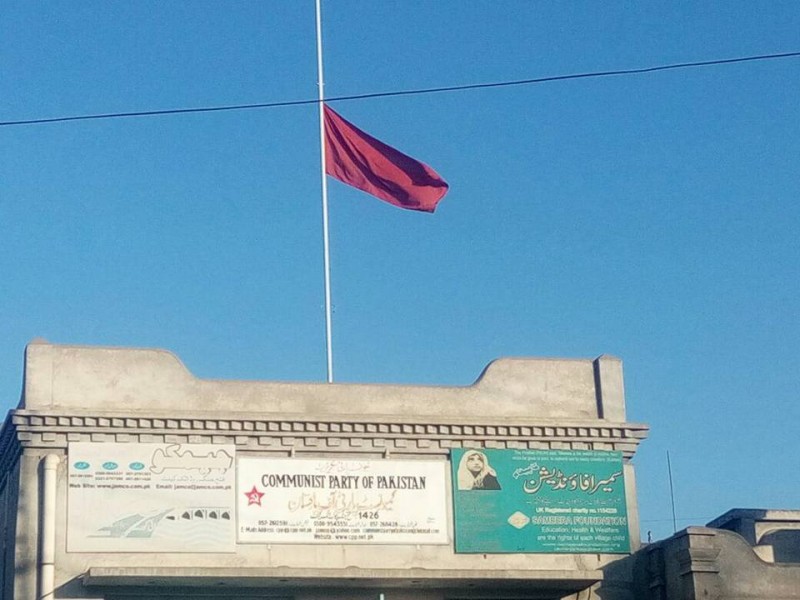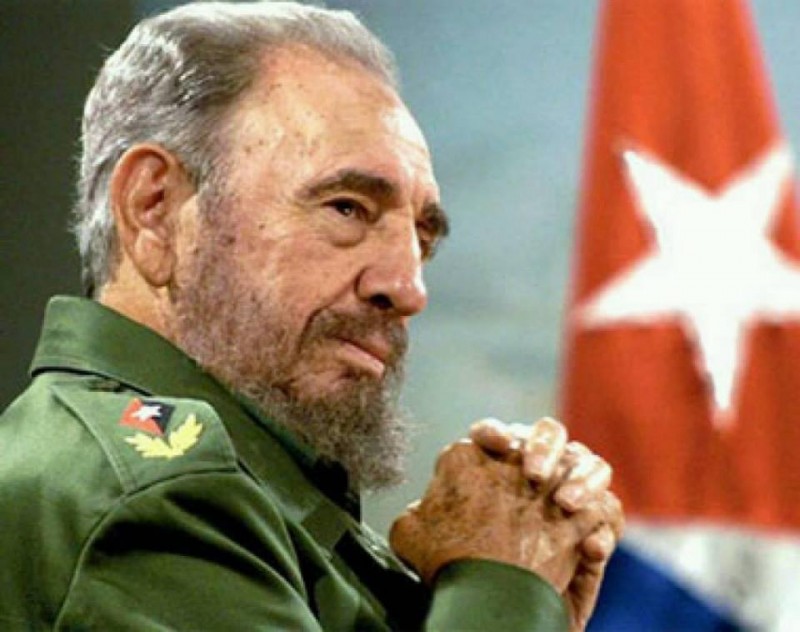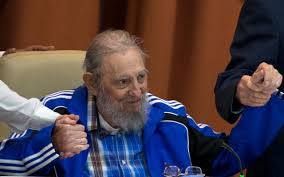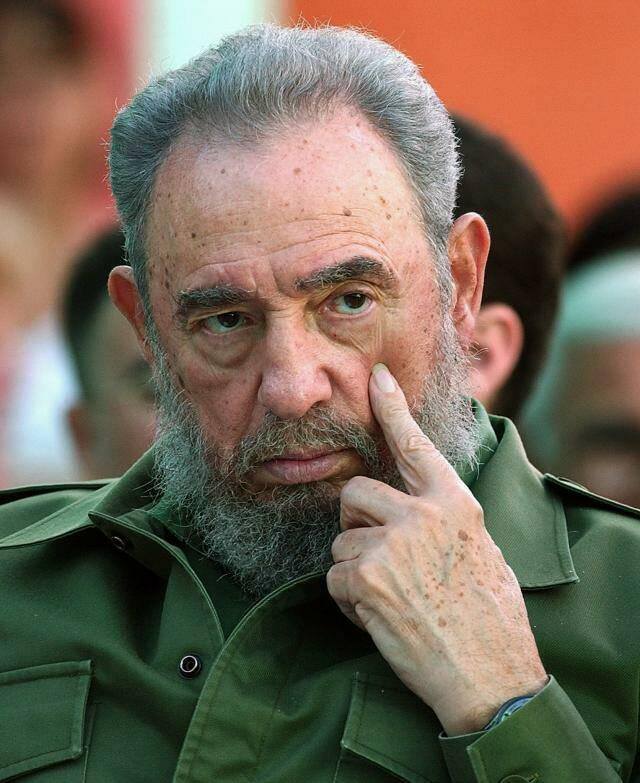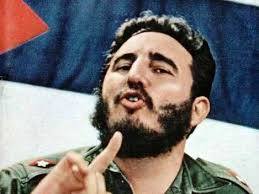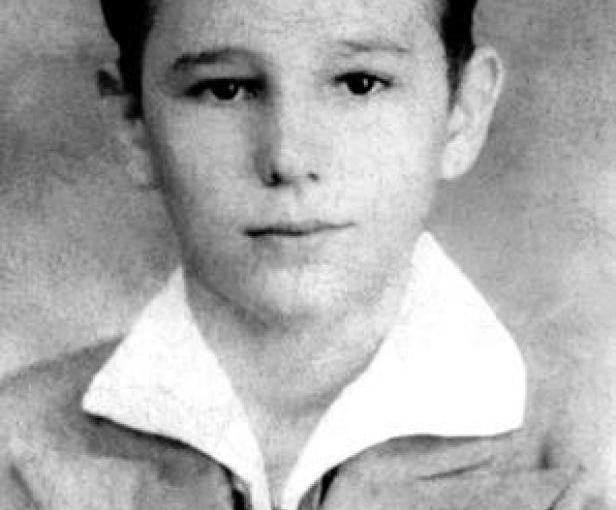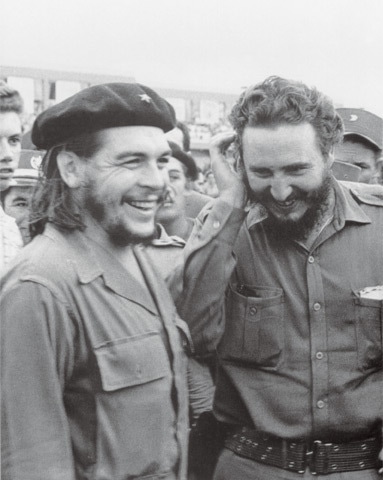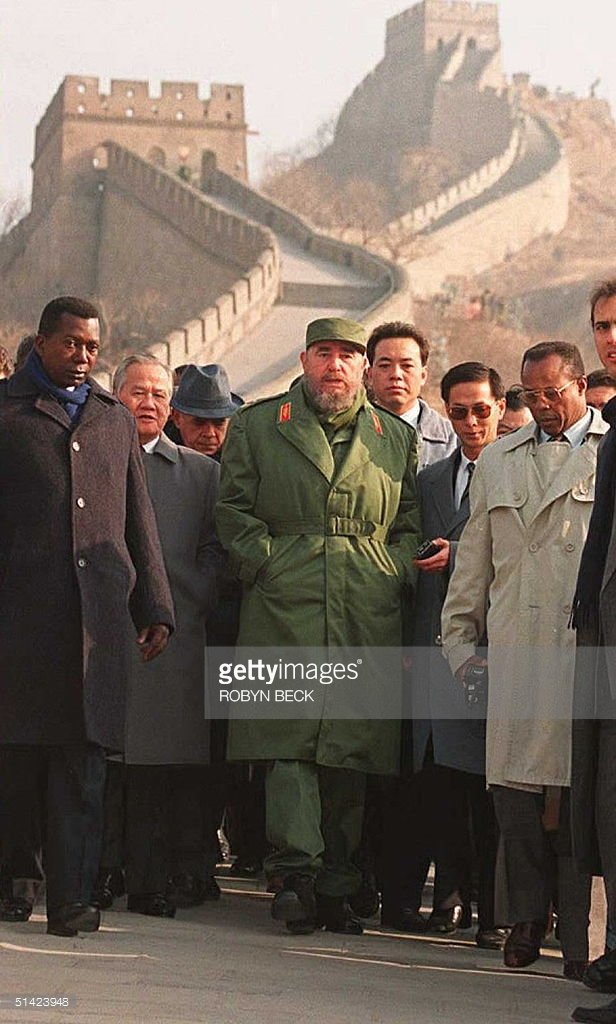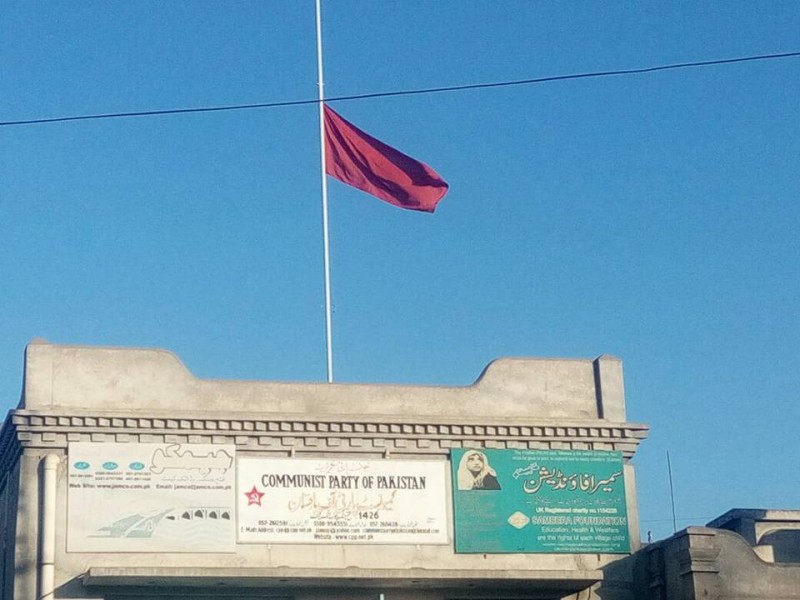Communist Party of Pakistan (CPP) flag to fly half-mast for 7 days has now been extended till December 4, 2016 when the Castro’s ashes would be buried in the southeastern city of Santiago says the press release issued here today by the Press Media of CPP.
“Castro, a living communist legend, who has achieved immortal historical achievements for the development of world socialism. He was the great person of our era, and people and history will remember him forever,” says the Communist Party of Pakistan (CPP) and its Chairman Engineer Jameel Ahmad Malik in his condolences message to Fidel Castro’s family and to the Communist Party of Cuba.
On the sad demise of the great communist leader, the earlier announcement that the CPP flag at the Communist Party Secretariat in Attock Cantt to fly at half-mast for 7 days to mourn the Fidel Castro’s death has now been extended till December 4 to show our party solidarity with the peoples of Cuba.
CPP said “SUMMING up the life of Fidel Castro in this space is indeed a difficult task, for the Marxist revolutionary was an international icon whose appeal transcended cultures and ideologies, and whose feats were numerous.”
Fidel Castro, the bearded revolutionary icon who imposed socialism on Cuba and survived assassination attempts, an invasion, and isolation as the stubborn nemesis of 10 US presidents, has at last died. Comrade Castro was 90.
Engineer Jameel said “The Pakistani communist and people have lost a good and true comrade. Comrade Castro will live forever in history.”
He also said that Pakistan witnessed the Cuban humanitarian spirit first hand, when over a million people were treated by Cuban doctors in the aftermath of the 2005 Kashmir earthquake.
Engineer Jameel said that “He was not living as billionaire laundering money off into a Panamanian bank account or anything like that; he was good for the people.”
“There will be no one else like him. We will feel his physical absence,” the CPP Chairman said.
Castro left Cuba with free healthcare, free schools, and not a single street in his name or a single statue in his honour.
In his final years, Fidel Castro no longer held leadership posts. He wrote newspaper commentaries on world affairs and occasionally met with foreign leaders but he lived in semi-seclusion.
The towering personality of the 20th century has passed away. His achievements and those of Cuba under him are monumental. Former Cuban leader Fidel Castro was a legendary survivor — besting what Cuban officials say were more than 600 attempts to kill him.
He lived much of his long life in the spotlight — and much of it in the cross hairs — surviving a half century of assassination plots.
“He was one of the leading figures of the Cold War, of world politics and he transformed Cuban society and gave meaning and dignity to the words ‘being Cuban.’’’ said the CPP.
Castro seized power in 1959 in an insurgency that ousted the corrupt, US-backed government of General Fulgencio Batista. Purging Batista loyalists and alienating US business interests and wealthy Cubans, Castro’s revolutionaries took control of industry, expropriated private assets, and nationalized land holdings, spurring an exodus of wealthy Cubans to the United States.
A charismatic and commanding presence instantly recognizable for his bushy beard, rumpled olive-green fatigues, and shin-high black boots, Mr. Castro won over the masses by preaching an end to social inequities and by making health care and education free. He made an enemy of Washington by seizing US assets on the island, allying himself with Soviet leader Nikita Khrushchev, and bringing Washington and Moscow to the brink of nuclear war during the 1962 Cuban missile crisis.
Castro’s death drew strong reactions from world leaders.
The leader of the French Communist Party, Pierre Laurent, who told French TV that Fidel Castro had “liberated his people in 1959, at a time when the island was in some ways the brothel and the casino of rich Americans. Then he faced American imperialism. He was one of the leaders of the movement of human emancipation in the 20th century. The revolution he led took place at the time of decolonisation and was part of this movement to restore the sovereignty of peoples. That is what will remain in history.”
In Britain, former London mayor Ken Livingstone said Mr Castro was an “absolute giant of the 20th century”, and blamed the US for the restrictions on civil liberties under his leadership.
He told BBC Radio 4’s Today programme “of course Fidel did things that were wrong”, adding: “Initially he wasn’t very good on lesbian and gay rights, but the key things that mattered was that people had a good education, good healthcare and wealth was evenly distributed.
On this occasions, our National poetess Fahmida Riaz has very rightly expressed her views as under:-
دوستو آیئے ہم پاکستانی وشویل میڈیا کی اس بے حسی کی مذمت کرین کہ آج کاسترو کے انتقال پر کوء ایک ڈھنگ کا پروگرام نہین پیش کیا اور اسے گویا جوتی کی نوک پر رکھا جب کہ دنیا بھر میں اس کا چرچا ہوا ہے ۔ مانا کہ ی اشتہاروں سے چلتے ہیں لیکن پاکستان کی سول سو سایٹی میں ایسے لوگ موجود ہیں جو کچھ بہتر شعور رکھتے ہیں اور وہ بھی یہ سابن وابن استعمال کرتے ہین جن کے اشتہارون کو افیم کی گولی کی طرح لت لگانے والی لا یعنی سول ملتری افواہون کو چلاتے رہنے کے لیئے استعمال کیا جاتا ہے ۔۔ہم نے آج اپنی شدید غلامانہ جاہلانہ ذہنیءت کا ثبوت دیا ہے
مزمت مزمت مزمت
فیدل کاسترو کیلئے چے گیوارا کا منظوم خراجِ عقیدت جسکا میں نے ہری پور جیل میں 1983 میں ترجمہ کیا– پھر سے کاسترو کی نزر کرتا ہوں–
کاسترو کے نام
چلو چلیں
صبح صادق کے، آتشیں پیمبر
مخفی راھیں پاٹ ڑالیں
وادئ سبزہ زار آزاد کرانے کو
تُجھے، جو جاں سے پیاری ہے
چلو چلیں
ڑھیروں مظالم کا حساب چُکانے
ھماری باغی شہابوں سے
مزین پیشانیاں
فتح یا موت کی قسم کھاتی ھیں
جب تُم، چار مانگوں
زمین،آزادی،روٹی اور انصاف
کی بازیابی کی، صدا دوگے
لبیک کہنے کو ھم، وہاں ہونگے
ھم وہاں ہونگی
چلو چلیں
صبح صادق کے، آخری پیمبر
“The name of this distinguished statesman is rightly considered the symbol of an era in modern world history,”
The bearded, cigar-puffing leader, renowned for trademark army fatigues and hours-long public tirades, grabbed power in a January 1, 1959 revolution.
Living by the slogan “socialism or death,” he kept the faith to the end, even as the Cold War came and went.
Castro married three times and is known to have fathered eight children. He met Celia Sanchez in 1957 and remained with her until her death in 1980.
Since the 1980s, Castro’s partner has been Dalia Soto del Valle.
The most recent photographs of him were published last week, showing him in the trademark white tracksuit that he wore in later years after hanging up his green military fatigues.
He was last seen in public on his 90th birthday on August 13. “Soon I will end up like everyone does,” he said. “We all have our turn.”
President Raul Castro, who took control of the government from his ailing brother in 2006, said on state television that his older brother died at 10:29 p.m. Raul Castro ended the announcement by shouting the revolutionary slogan: ‘‘Towards victory, always!’’
The government on Saturday decreed nine days of mourning.
From November 26 to December 4, “public activities and shows will cease, the national flag will fly half mast on public buildings and military installations,” a statement from the state executive said.
Castro’s ashes will be buried in the southeastern city of Santiago on December 4 after a four-day procession through the country, it added. Santiago was the scene of Castro’s ill-fated first revolution attempt in 1953.
Fidel Castro Ruz was born Aug. 13, 1926, on his father’s sugar plantation in Birán, in eastern Cuba. He was the third of several children born to Ángel Castro, a Spanish immigrant who became a wealthy sugar cane and cattle farmer, and housemaid Lina Ruz, whom Mr. Castro’s father eventually wed.
As a teenager, Mr. Castro is said to have changed his middle name to Alejandro, in admiration for Alexander the Great, the Macedonian conqueror. Mr. Castro attended Jesuit boarding schools, a formative experience he credited with both sharpening his mind and fostering a sense of commitment.
He studied law at the University of Havana, where he became fascinated with politics and was exposed to campus gangs that condoned violence for political ends.
In 1948, he visited Bogotá, Colombia, for a student congress and got swept up in the chaos and a nascent and failed insurrection that followed the assassination of a leftist Colombian political leader. It was an event that biographers say helped transform a student into an advocate of guerrilla warfare and, eventually, a warrior.
“He learned you’ve got to be organized. Select well whom your allies are,’’ Dominguez said, adding that those lessons echoed the writings of one of his favored revolutionaries, Vladimir Lenin.
When Mr. Castro returned to Havana, he married MirtaDíaz Balart, who hailed from an elite family. They had a son named Fidel in 1949 and divorced in 1955.
Mr. Castro graduated with a law degree in 1950 and began a practice specialized in defending poor people whose properties were being seized by the government. Fiercely critical of corruption and dedicated to social reform, he became a candidate for Parliament in 1952. Elections were cancelled following a coup by Batista. In response, the young lawyer sued Batista for violating the constitution. The court rejected the claim.
Deciding that armed struggle was the only way to overthrow Batista, Mr. Castro led a group of 123 men and women, mostly young intellectuals with no military experience, in a disastrous July 26, 1953, attack on the Moncada barracks, a military installation. Most of the rebels were killed; the survivors, including Mr. Castro and his brother Raúl, were jailed. At his trial, Mr. Castro delivered an impassioned speech against tyranny, uttering the famous words, “History will absolve me.’’
Sentenced to 15 years in prison, he was released in May 1955 as part of an amnesty. Taking exile in Mexico, Mr. Castro met Ernesto “Che’’ Guevara, an Argentine-born doctor and socialist who became one of Mr. Castro’s trusted lieutenants and began organizing exiles into the 26th of July Movement.
In a Mexico City Cantina in 1956, they concocted another scheme to overthrow the government, and in December, 82 rebels sailed for Cuba aboard a pleasure yacht built for eight called “Granma.’’ Many were killed, but the survivors escaped into the Sierra Maestra mountains in eastern Cuba, where they raided government arsenals for weapons and launched chaotic, small-scale attacks on Batista’s forces.
At first, the revolutionaries were largely ignored by the Cuban public. When the economy began to sputter, however, Batista lashed out at the rebels and dissidents with a series of draconian measures. In response, students and urban intellectuals held strikes in cities in support of the revolutionaries.
Sentiment began to turn against the general, particularly in the military. Disillusioned soldiers began deserting by the thousands, turning themselves over to the rebels at such a rate that they outnumbered their captors. In 1958, the US government withdrew its military assistance to the Batista regime, and after his forces lost a decisive battle, the dictator fled on Jan. 1, 1959.
“This is really the army surrendering, not so much Fidel beating them,” Dominguez said, recalling those days.
Days later, truckloads of Mr. Castro’s “bearded revolutionaries,’’ as they were described in newspaper reports at the time, rolled triumphantly into Havana, with a 32-year-old Mr. Castro standing erect in a beat-up Jeep, a rifle in one hand and a cigar in the other.
In a bid to build support for his emerging government, he gave soaring speeches, about one every other day.
“We overthrew the tyranny to free the people from murder, torture, and oppression and from misery,’’ he said in a speech before tens of thousands on July 26. “This is the secret of our revolution, of the power of our revolution, which turned its eyes to the most humble to help them.
“This is the only crime that we have committed.’’
His ability to fiercely fuse a sense of purpose, national pride, and defiance in his speeches won over Cubans.
The new government 90 miles south of Florida was initially recognized by President Eisenhower, but friction quickly grew as Mr. Castro began seizing property owned by major US corporations, offering scant compensation, and arresting and executing Batista supporters. Mr. Eisenhower snubbed Mr. Castro when the Cuban leader visited the United States on a charm offensive in April 1959, leaving Vice President Nixon to greet him and report that he was “naïve’’ but not necessarily a communist. In Mr. Castro’s early months, the government slashed rents for the poor, confiscated and redistributed land, including Mr. Castro’s family plantation, nationalized utilities, and abolished segregated facilities.
By October 1959, the United States was plotting to overthrow the Castro government, according to declassified national security documents.
In January 1961, Eisenhower severed diplomatic ties, and on April 17, with the approval of a newly inaugurated President Kennedy, a CIA-trained force of 1,400 Cuban exiles launched an invasion at the Bay of Pigs. Mr. Castro repelled the assault, burnishing his stature as a giant-killer and cementing his ties to the Communist bloc. Two weeks later, in his May Day speech of 1961, he declared to a cheering crowd that Cuba was socialist and abolished elections, saying opponents of the revolution had to be stopped. The United States imposed a trade embargo that remains today, although it has been gradually weakened under the Obama administration.
In October 1962, Mr. Castro became the center of world attention during the Cuban missile crisis. After discovering the Soviets were setting up long-range ballistic missiles on Cuba, Kennedy imposed a naval blockade and prepared for attacks. Mr. Castro urged Khrushchev to launch a nuclear strike if Washington invaded Cuba. For 13 days, Americans prepared for a nuclear exchange, until Khrushchev agreed to a deal to remove the missiles.
It was later revealed that the United States secretly agreed to remove nuclear installations in Turkey.
A steadfast ally for the Soviet Union for decades, Mr. Castro’s Cuba would eventually surpass its patron in supporting communist guerrillas and governments in the restive lands of post-colonial Africa and Latin America.
“This was the only communist country capable of thousands of troops overseas and winning,’’ Dominguez said, citing Cuba’s role in Angola and Ethiopia. “The Soviet Union couldn’t.’’
For such a tiny island nation, its influence in these corners of the world was immense. Over the decades, Mr. Castro sent soldiers, advisers, and equipment to bolster socialist uprisings in about two dozen countries, including Mozambique, El Salvador, and Nicaragua.
Mr. Castro also sent doctors to serve dozens of nations, and in many poor parts of the developing world, he is considered a champion of the underclasses.
Toward the end of his tenure, Mr. Castro formed a close friendship with then-President Hugo Chávez of Venezuela, inspiring the former colonel to adopt socialism and brokering a deal that sent Cuban health workers there in exchange for 90,000 barrels of subsidized oil a day for Havana, reportedly allowing Mr. Castro to sell the excess for a profit.
Over the years, the CIA attempted to sabotage, assassinate, or humiliate Mr. Castro, with failed plots ranging from an exploding cigar and a fungus-lined wetsuit to contaminated shoes intended to make his beard fall out. The CIA even offered the Mafia $150,000 to kill him.
By some estimates, Mr. Castro survived more than 600 attempts on his life.
With his domestic policies, he placed every aspect of life, from education to the media, under Communist Party control. Cuba’s literacy rate soared and its doctors and medical facilities were considered among the best in Latin America and its levels of indigence among the lowest.
But the regime also created labor camps for opponents and “deviants.’’ Human rights groups estimate that between hundreds and thousands of “counterrevolutionaries’’ were killed in the first seven years of Mr. Castro’s rule. He established a Soviet-style security force that, while reducing street crime, spied on citizens’ activities.
Huge numbers of Cubans who suffered repression or economic privation have fled the island illegally, risking prison or death if caught. An estimated 250,000 of a population of 6 million left in the first few years. Another 260,000 were airlifted out by the United States between 1965 and 1973.
In 1980, Mr. Castro responded to a mass uprising by allowing dissidents to leave Cuba, encouraging criminals and mental patients to join them on overcrowded boats. In what came to be known as the Mariel Boatlift, 125,000 Cubans — including 25,000 with criminal records — landed on Florida’s shores.
During an economic crisis 14 years later, another 32,000 disaffected Cubans commandeered rafts, boats, inner-tubes, and hollowed-out car bodies to sail for US shores before Mr. Castro prevented more from following.
The collapse of the Soviet Union in 1991 created severe economic hardships for Cuba, spurring disaffection even among loyalists. Facing billions of dollars of losses in trade and subsidies, Mr. Castro opened up some of Cuba’s real estate and tourism industry to attract foreign investment. He legalized US dollars, limited self-employment, private restaurants, and farmers’ markets, later rolling back some of the reforms.
In November 1999, Mr. Castro reprised his role as an old thorn in Washington’s side, demanding the US government return Elián González, a 5-year-old boy who survived a boat wreck that killed his mother during an escape from Cuba. The bitter debate dragged on for months, pitting the exile community against its archenemy in Havana. Finally, US officials stormed the home of the boy’s relatives in Miami and reunited with him with his father in Cuba, an outcome that was seen by many as another victory for Mr. Castro, unbowed after 40 years.
With the end of the Cold War, the liberalization of Russia’s and China’s economies, and a worldwide shift toward global trade, Mr. Castro’s communist rhetoric no longer carried the same thunder. Though he still rallied throngs of supporters at hours-long outdoor rallies, his narrow, 6-foot-tall frame showed signs of fraying health. In 2001, he fainted during a speech; three years later, he fell during another, breaking two bones. An acute infection in his colon forced him to temporarily transfer his power to his brother, Raul, and Cabinet ministers in 2006.
Two years later, he stepped down as president, ending one of the longest, and most enigmatic tenures in the 20th century, and turning over power to his brother, Raul.
In February 2013, Raul announced that he would retire as president in 2018 and named newly minted Vice President Miguel Diaz-Canel as his successor.
Mr. Castro receded from the spotlight in his final years, except for occasional appearances to greet visiting heads of state or to attempt to dispel rumors about his declining health. He fitfully wrote short columns for the Cuban media.
Also, the orator famous for hours-long speeches opened and maintained a Twitter account; his tweets were usually only links to other media, not 256-character bits of revolutionary prescriptions.
Mr. Castro was fiercely private about his personal life. According to a videotape smuggled out by an ex-girlfriend of one of his sons, he lived mainly in a Havana family compound with a small pool and a giant television, but few other luxuries. He was described by associates as a fan of baseball, fine wines, literature, and classical music. He gave up his emblematic cigars years ago for health reasons.
‘‘I’ll be 90 years old soon,’’ Castro said at an April 2016 communist party congress where he made his most extensive public appearance in years. ‘‘Soon I’ll be like all the others. The time will come for all of us, but the ideas of the Cuban Communists will remain as proof that on this planet, if one works with fervor and dignity, they can produce the material and cultural goods that human beings need and that need to be fought for without ever giving up.’’
Mr. Castro had five sons with his longtime companion, schoolteacher Dalia Soto del Valle. He also fathered a daughter, Alina Fernández, from an affair.
His brother Raul Castro negotiated an opening with President Obama on Dec. 17, 2014, and the two nations announced they would move to restore diplomatic ties. The two nations are on a path to normalization, a remarkable development punctuated by Obama’s speech in March at Havana’s historic Gran Teatro.
Fidel Castro and Obama reportedly did not meet during that visit, but Mr. Castro left no doubt about his impressions of the development and Obama’s speech. In a tone dripping with scorn and packed with defiance, Mr. Castro scolded Obama in a 1,500-word letter titled “Brother Obama.’’ He accused the president of being patronizing and ignorant of history.
Cuba, he added, needs “no gifts from the empire.’’
Raul Castro vows to step down when his term ends in 2018 and the Communist Party has elevated younger leaders to its Politburo, including 56-year-old Miguel Diaz-Canel, who is first vice-president and the heir apparent.
Nine days of mourning have been declared following Castro’s death, with a funeral set for December 4.
Notable quotes of Fidel Castro:

Here are some of his more notable quotes.
“Condemn me. It does not matter. History will absolve me.”
Oct 16, 1953, at his trial for a rebel attack that launched the Cuban Revolution.
“I am not interested in power nor do I envisage assuming it at any time. All that I will do is to make sure that the sacrifices of so many compatriots should not be in vain, whatever the future may hold in store for me.”
Jan 1, 1959, when the revolution triumphed.
“Workers and farmers, this is the socialist and democratic revolution of the humble, with the humble and for the humble.”
April 16, 1961, declaring his government socialist.

“I believe that aggression is imminent in the next 24 to 72 hours.”
Oct 26, 1962, commenting on the possibility of a US attack in a memo to Soviet Premier Nikita Khrushchev during the tensest hours of the Cuban missile crisis.
“Millions of Cubans shed their tears today together with the loved ones of the victims of the abominable crime. And when an energetic and forceful people cry, injustice trembles.”
Oct 15, 1976, addressing more than one million mourners in Havana the week after the terrorist bombing of a Cuban airliner killed 73 people.
“Today it hurts us if a Cuban is hungry, if a Cuban has no doctor, if a Cuban child suffers or is uneducated, or if a family has no housing. It hurts us even though it’s not our brother, our son or our father. Why shouldn’t we feel hurt if we see an Angolan child go hungry, suffer, be killed or massacred?”
March 30, 1977, to Cuban civilian and military personnel in Luanda, Angola.
“Cuba is not opposed to finding a solution to its historical differences with the United States, but no one should expect Cuba to change its position or yield in its principles. Cuba is and will continue to be socialist. Cuba is and will continue to be a friend of the Soviet Union and of all the socialist states.”
Dec 20, 1980, to the congress of the Communist Party of Cuba.
“We will take the steps we have to take to keep our factories running, to keep our workers employed, to keep going forward in these difficult conditions, and … find the formulas to save the country, save the revolution and save socialism.”
Oct 14, 1991, to the Communist Party congress as Cuba feels the first effects of waning Soviet trade.
“We will win this battle for life, and not only for your lives, but also for the lives of all children in the world.”
Dec 23, 1999, calling on schoolchildren to participate in the fight to repatriate Cuban boy Elian Gonzalez.
“I promise that I will be with you, if you so wish, for as long as I feel that I can be useful – and if it is not decided by nature before – not a minute less and not a second more … Now I understand that it was not my destiny to rest at the end of my life.”
March 6, 2003, upon being re-elected by Cuba’s National Assembly to a sixth term as Council of State president.
“I do not have the slightest doubt that our people and our revolution will fight to the last drop of blood to defend these and other ideas and measures that are necessary to safeguard this historic process.”
July 31, 2006, announcing he had undergone intestinal surgery and temporarily ceded his powers to his younger brother Raul, Cuba’s defence minister.
“I am saying that I will neither aspire to nor accept – I repeat, I will neither aspire to, nor accept – the positions of president of the State Council and commander in chief.”
Feb. 19, 2008, announcing his resignation as president.
“I was at death’s door, but I came back.”
Speaking of his 2006 illness in an August 30, 2010 interview with Mexican daily La Jornada.

“The new generation is being called upon to rectify and change without hesitation all that should be rectified and changed … Persisting in revolutionary principles is, in my judgment, the principal legacy we can leave them.”
April 18, 2011 opinion piece written during a key Communist Party congress on the need to hand over power to young leaders. At the congress, Castro stepped down as head of the party. But despite talk of rejuvenation, he was replaced by his 79-year-old brother Raul, with two grey-haired veterans of the revolution selected as his chief deputies.
‘We don’t need presents from the empire. …My modest suggestion is that he reflects and doesn’t try to develop theories about Cuban politics.”
Castro wrote a 1,500-word letter in state media titled “Brother Obama” in response to the US president’s visit to the country in March 2016.
“I’ll be 90 years old soon. Soon I’ll be like all the others. The time will come for all of us, but the ideas of the Cuban Communists will remain as proof that on this planet, if one works with fervor and dignity, they can produce the material and cultural goods that human beings need and that need to be fought for without ever giving up.”
At an April 2016 Communist party congress where he made his most extensive public appearance in years.
Long live — Fidel Castro
Long live — Socialism
Long live — Communist Party of Cuba
